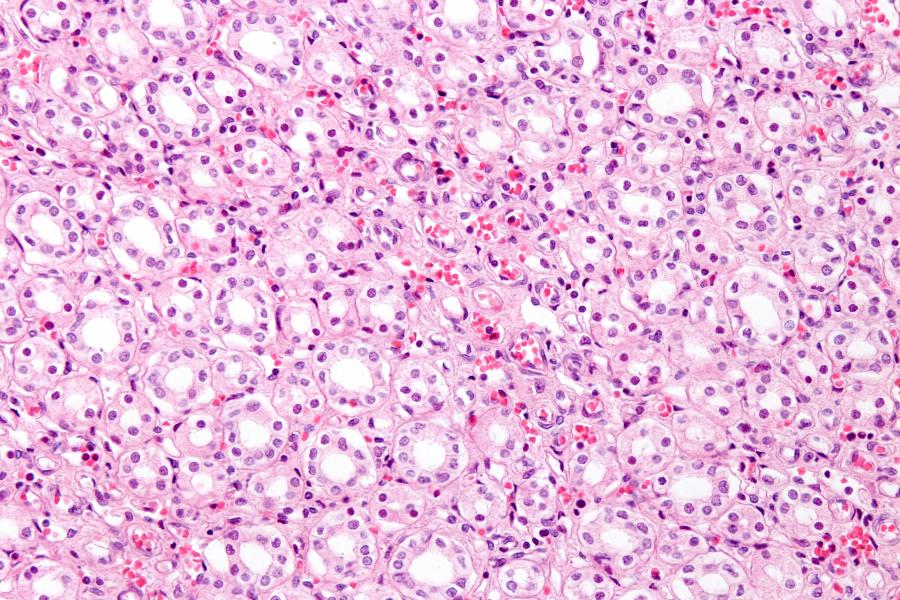- Name
- Jill Rosen
- jrosen@jhu.edu
- Office phone
- 443-997-9906
- Cell phone
- 443-547-8805
- Name
- Jamie Smith
- jsmit449@jhu.edu
- Office phone
- 410-614-5381
- Cell phone
- 410-245-1106
Tissue donors for the first time will be able to track how their samples are used by scientists while safeguarding their privacy, through a pilot program launched by Johns Hopkins Berman Institute of Bioethics faculty and breast cancer researchers at the University of Pittsburgh's Institute for Precision Medicine.
When Henrietta Lacks' cancer cells were taken by a doctor in 1951, it was without her knowledge. Neither she nor her family were informed about the subsequent use of her "immortal" cells in medical research around the world. Today, researchers cannot use patients' tissues without permission, but patients never know what becomes of their samples.
The pilot program will use blockchain technology to give every patient who consents to the use of their tissue samples for research at the University of Pittsburgh's Breast Disease Research Repository the opportunity to track their use in perpetuity, while keeping their identities anonymous to the researchers.
"A healthcare system built on de-identification emphasizes privacy but sacrifices our duties of clinical care to patients," said Jeffrey Kahn, the Andreas C. Dracopoulos director of the Berman Institute. "It limits the effectiveness of science and prevents any attempt to share the broader benefits of research discoveries with those who contribute to its success."
Today's standard of informed consent assures patients that their tissues cannot be used in medical research without a signed agreement and must be stripped of identifying details such as names and birth dates. But because of these well-intended privacy measures, individuals never know how their tissues are used, or by whom, nor do they know if they led to any discoveries.
The program will provide participants with a non-fungible token (NFT) that will allow them to follow their samples. NFTs are digital assets on a blockchain with unique identification codes and metadata that distinguish them from each other, while their owners' identities remain encrypted. A blockchain is a shared, tamper-proof ledger that facilitates the decentralized recording of information that can be audited by computer code to prove ownership and permissions.
All patients who have consented to participate in Pitt's Breast Disease Research Repository will be invited to be part of the project, said Marielle Gross, adjunct professor of bioethics at the Berman Institute and a women's health physician at the University of Pittsburgh, adding that during its pre-pilot phase the first 20 patients contacted signed up within 24 hours.
"NFTs and blockchain technology offer an innovative solution to reconnect individuals with their contributions to research, without compromising privacy or provenance. Bringing patients into the fold as true stakeholders in research allows for increased trust, transparency, and participation in biomedical research," said Gross, adding that the blockchain technology could allow labs from across the country using the same donor's samples to collaborate and share the results.
"Right now, there are researchers working in labs literally right next door to each other who aren't aware they're researching samples from the same individual," said Gross. "This new approach to privacy-protecting tissue sharing can enable us to maintain patient confidentiality while simultaneously maximizing research benefits and unlocking the future of precision medicine."
The project arose from work Gross initiated as a Hecht-Levi postdoctoral fellow at the Berman Institute. Funded by a grant from the Emerson Collective, the project builds upon the Berman Institute's expertise in research ethics, reconsidering the obligations institutions have to research participants, and finding ways to incorporate new technologies into existing human subject protections.
Gross has created a startup, heny, Inc., with Kahn's support and ethical oversight, that seeks to use the blockchain technology to extend personalized biobank access to all research participants within and beyond the current pilot population.
Posted in Science+Technology, University News, News+Info
Tagged bioethics, berman institute of bioethics, cells, patient privacy








